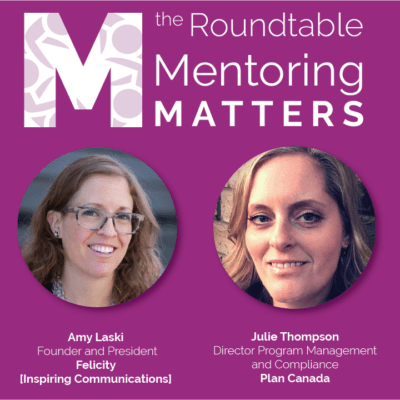We’re living in a world of work where the pace continues to get faster, the demands continue to get greater and the advancements in technology are constant. Segregating work from personal has become increasingly difficult, and striking a balance that accommodates both personal needs and those of our employer is a challenge that many of us struggle with on some level.
This month we sat down with Roundtable members Amy Laski and Julie Thompson to get their perspectives on how to make time for personal priorities and maintain a healthy state when the demands of the business may seem not to allow for it. Here are some of their thoughts and insights:
Amy Laski, Founder and President of Felicity [Inspiring Communications] speaks in terms of “work-life integration” rather than ‘work-life balance”. She points out that, with the evolution of technology, work will inevitably creep into our personal life and vice versa. Amy suggests that establishing a standard of work-life integration is often impeded by GUILT. Guilt is a major driver of feeling like work is paramount. Guilt that you ought to put in overtime to show you are eager to advance, take on extra projects to stretch your capabilities and add transferable skills to your resume. You should. So you do.
To empower ourselves to set the standard for our work-life integration, Amy encourages us determine the real and potential source of this guilt and identify where there are opportunities to manage and/or quieten it. She highlights these three guilt lenses:
Organizational – workplace culture and norms
Managerial – leader expectations
Self – our own ability to set boundaries
Julie Thompson, Director Program Management and Compliance at Plan Canada reminds us that small steps can create better habits and big gains. She shares these strategies that have helped her to make some progress with work-life balance.
Prioritize – Sometimes you just need to accept that you can’t do everything. Determine what’s urgent and what’s not. TWEET THIS
Delegate – I have learned that I can’t, and perhaps shouldn’t, do it all. Delegating is a good opportunity for others to grow and learn – as long as it’s done well. Remember to ensure clarity around expectations and keep communication high through regular update meetings. TWEET THIS
Work From Home – Working from home can provide great flexibility to get some personal things done during the work day or early evening avoiding the commute; whether it be an appointment, laundry or a class. If this is something you can arrange, building trust early on and then maintaining it is key. High communication, being available and responding quickly, being proactive and transparent about when you are not available and why, are all strategies that have been helpful to me in building and maintaining the trust around this arrangement. TWEET THIS
Schedule Time for Yourself – Whether it is a run, a yoga class, or walking the dog, scheduling time for these types of things in the same way that I schedule a meeting helps me see it much more like a commitment. TWEET THIS
Step Away From the Work Environment – Whether at a home office, corporate office or hotel office, a short break away from the working environment can help the day feel so much more balanced. It may be taking a walk, going to the gym, going to the coffee shop or the park with a book, or getting out for a meal with a colleague when travelling. It doesn’t need to be for long to make a difference. And, when I am unable to physically step away, taking a few minutes to listen to some music to get me grounded or energized again usually does the trick! TWEET THIS
Take Vacation – Taking vacation allows for the opportunity to recharge and regain perspective and to think more strategically. It also sets the tone for team members as to the importance of vacation and taking time for one to recharge and come back fresh and recommitted. TWEET THIS
How we define balance, or the standard we set for work-life integration, is very personal. What works for one, may not work for another. And, what one defines as good balance today may be different than one defines as a good balance at a different stage in life. It’s up to us to define it… and then to take the steps we can to live it!




